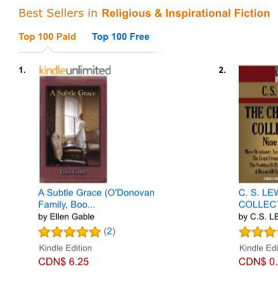Ellen Gable's Blog, page 55
December 9, 2015
Prayer: The Cry of a Child (by Catherine Doherty)
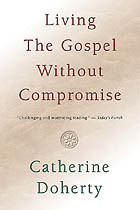 As we get closer to Christmas, I’d like to share a beautiful excerpt, this one from Catherine Doherty’s “Living the Gospel Without Compromise.” This is entitled “Prayer: The Cry of a Child” and is available free as a Pass it On article at this link.
As we get closer to Christmas, I’d like to share a beautiful excerpt, this one from Catherine Doherty’s “Living the Gospel Without Compromise.” This is entitled “Prayer: The Cry of a Child” and is available free as a Pass it On article at this link.
The first step in praying is to understand who we are, and that is awfully difficult. We must acknowledge that we are creatures, saved sinners, entirely dependent on God. We must be, as the bible says, anawim, poor people of God, the poor people of the beatitudes who know that they depend on God. We must face ourselves and realize that we cannot exist on our own, that we are dependent.
To the proud, this is anathema. We look at ourselves and we say “I depend on no one” — and suddenly, in the very saying, we realize that this is not so: we do depend on God. This is the beginning of prayer: that we become beggars before God, knowing that we receive even the steps we take from him.
To begin to pray we must first cleanse our souls of arrogance and pride. In grave humility and as beggars, must we come to him who alone can make us princes and kings and queens, not of earthly kingdoms, but of the kingdom of God. Only when we are thus poor and realize our total poverty, can we go to Bethlehem and meet the Child who became poor for us.
Is there any human being who does not respond to the cry of a child? Did you ever consider the first cry of the Child Jesus? It was his first message of love to us. When we know that we are poor, we can easily enter Bethlehem and answer his cry. We can easily walk behind the donkey that bears the woman and Child. If we are poor we will not hesitate to enter the humble home of Nazareth to take part in the hospitality of Joseph and Mary. Yet the proud and the arrogant look down their noses at simple folk from Nazareth: “Can anything good come from Nazareth?”
If we realize our own poverty we will follow him who had nowhere to lay his head. Prayer is the interpersonal relationship of a poor man with the Poor Man.
If we remain poor and keep following the Poor Man, a change will take place. Up to a point Christ will console us. But as our prayer deepens, we will enter the darkness of a fantastic faith, a faith that we have to pray for. The time will come when we will have to console Christ. For we see him all over the world — in slums, in Park Avenue — in people committing suicide because of the greed of people.
When we console him our prayer will take on a new dimension. The Son of Man became incarnate that we might console him, so that in consoling him we might learn to console one another, to be tender toward one another. He offered himself as a victim for us on the cross so that we might take him in our arms as Our Lady took him in hers.
Our prayer will be dirgelike, and yet, a joy! Our pain will be purified and our prayer will have moved into another dimension: we will want to be on the cross because Love is crucified. A strange thing will happen: our prayer will become a prayer of joy, a fantastic resting in the heart of God.
Thus from a recognition of our total dependence we are led to a prayer where we realize the Father is coming to us, know the touch of his hand, see Christ’s human face reflecting his glory. Thus does prayer become a total and final resting place, a unity, a complete union of ourselves with God. The darkness of faith grows light and there is no need for words anymore. There is only a need for rest, the rest of a beloved in the arms of her Beloved.


December 5, 2015
Advent Antidotes – Week 2
December 1, 2015
FREE thru 12/4: Carolyn Astfalk’s STAY WITH ME
November 30, 2015
Advent Humor
November 28, 2015
Advent Antidotes – Week 1
New video for Advent! Be part of the antidote of society’s impatience to celebrate Christmas even before Advent begins!


November 23, 2015
A Subtle Grace #1 in Canada
November 19, 2015
What Our Catholic Ancestors Can Teach Us About the Faith
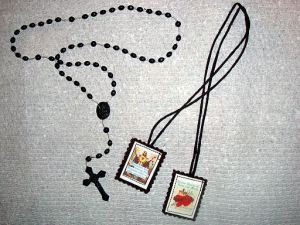
Photo from Wikimedia
My latest post from Catholic Mom is entitled, “What Our Catholic Ancestors Can Teach Us About the Faith.”
When a great uncle of mine passed away years ago, his closest family members went through his belongings, as per his wishes, and took mementos. A box was left over, I was told, of “religious items,” and I was asked if I’d like to have the box. As one of the few practicing Catholics in our extended family, I gratefully accepted the box.
I was delighted to find three Latin/English Missals from the 1940’s and 50’s, religious statues, rosaries, holy cards, a scapular and other Catholic sacramentals.
When my mother died eight years ago, my siblings and I went through her jewelry box. I was surprised to find a beautiful cameo miraculous medal and a card enrolling my mother (then a young teenager) in the “Miraculous Medal Society.” I now wear my mother’s miraculous medal.
My father, who died when I was a teenager, frequently recited the rosary. One image I recall from his wake is of my father, peaceful in death, his hands clutching his rosary.
Rosaries, scapulars, religious images, medals, holy water are all sacramentals, or visual reminders of our Catholic faith.
Catholic sacramentals have somehow lost popularity. While many Catholics still wear medals, the displaying of religious statues, icons and other sacramentals in Catholic homes is not as common anymore. Strictly speaking, it is not obligatory to use sacramentals. However, since they are reminders, they do help us in our journey towards heaven.
Our Catholic ancestors did not shy away from the faith. With few exceptions, they went to Mass every Sunday (with their Latin/English missal) and attended Mass often during the week, they abstained from meat on Fridays, recited the rosary, wore medals, proudly displayed crucifixes in their homes and religious statues in their gardens. Most had holy water fonts in their homes. They proudly proclaimed their faith and were not ashamed.
Recently, my scapular was hanging out in front of my shirt. A fellow parishioner asked me what it was. “It’s a scapular, a sacramental,” I replied. This fellow parishioner was around the same age and yet had never seen a scapular “up close” and didn’t know what a “sacramental” was.
When my parents attended grade school and high school in the 1940’s, catechism was memorized and learned from an early age. Young Catholics knew and understood when sin was sin; there was no watering down of the faith. There was no “subjective truth.” Pre-marital sex and contraception were sins and even if they fell into temptation and took part in these acts, they knew it was sinful and headed to confession immediately.
Now? Well, it’s a different story. Although some Catholics do know the teachings of the faith, many do not. In fact, I’ve spoken to Catholics who are under the mistaken impression that the Catholic faith is a democracy or opinion-based church. I’ve talked to Catholics who had no idea Sunday Mass was an obligation and missing it was a sin. I’ve spoken to Catholics who had no idea that living together before married was a sin or that birth control was a sin.
Sacramentals remind us of our faith. They remind us that our life here on earth is temporary and that heaven is our goal.
We have a lot to learn from our ancestors. Our Mass going, rosary reciting, scapular and medal-wearing ancestors understood the importance of sacramentals and the importance of knowing–-and practicing–-their faith.
To find out more information on the importance of sacramentals, check out this helpful link:
http://www.fisheaters.com/sacramentalsintro.html
Copyright 2015 Ellen Gable Hrkach


November 16, 2015
A Subtle Grace FREE on Kindle
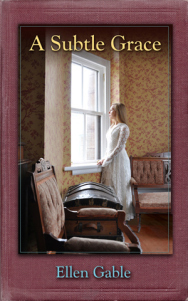 For the next three days, the stand alone sequel to my second book,A Subtle Grace (Kindle edition) will be FREE until Wednesday!!
For the next three days, the stand alone sequel to my second book,A Subtle Grace (Kindle edition) will be FREE until Wednesday!!
Of A Subtle Grace, Trisha Niermeyer Potter of Prints of Grace Blog said, “This is one of my favorite contemporary works of Catholic fiction. The storytelling is masterful, the characters fascinating, and the writing is of high literary quality. People are imperfect—past, present, and future—but each is given the opportunity to grow, change, learn, and be redeemed. In this story it’s shown how the greatest mistake of our lives can be turned into one of the most amazing blessings and even be a source of hope for others. A Subtle Grace has all of the elements that good Catholic fiction should.”
In her review, Jean Heimann, Catholic author and blogger, wrote that “In A Subtle Grace, Gable shows us through her characters, what happens when an individual lives his/her life based on principles rather than on passions. She clearly conveys the differences between love as a feeling vs. love as a choice, illustrating the consequences of each. Themes of redemption, forgiveness, discerning one’s vocation, healing, hope, and joy, all contribute to make this a story that tugs at the heart. A sequel to In Name Only, A Subtle Grace works well as an independent, stand-alone novel. You will definitely want to read both. A Subtle Grace is excellent read for historical romance fans. Those who enjoy Christian romance and suspense novels will find this story particularly enjoyable. This is a winner!”
Therese Heckenkamp, award-winning author of Frozen Footprints says, “A Subtle Grace is the sequel to the lovely book In Name Only, yet A Subtle Grace can be enjoyed independently. Of course, readers of the first book won’t want to miss this one! The story kept me so interested that I hardly realized this was, in fact, a lengthy book. A Subtle Grace is a novel to stir your heart, your emotions, and your soul. I highly recommend it!”
Click here to read an excerpt and more reviews.
To download the book for FREE click here.


November 11, 2015
Veterans Day/Remembrance Day 2015
Today is Remembrance Day/Veterans Day. I’d like to remember in a special way my father, father-in-law and stepfather (all now deceased). Each served their country in war: my father-in-law was in the United States Air Force during World War II and was Missing in Action for months, my father and stepfather (my father’s first cousin) both served in Korea. This is also my father’s birthday. He died in 1978 at the age of 49.
Remembering Tony An article about my father-in-law, who was a gunner for the USAF in WW II. He was shot down over Yugoslavia, near his father’s birthplace.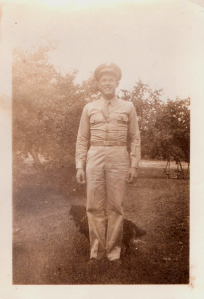
Remembering Dad A tribute to my own father, who served in both the USMC and the United States Army, and who died when I was 18.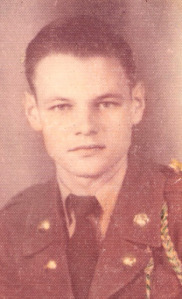
This last post is a special way to remember, with fondness, the three father figures in my life: Remembrance Day/Veterans Day 2009
Lest We Forget…


November 9, 2015
Prayer of a Soldier in France (1918)
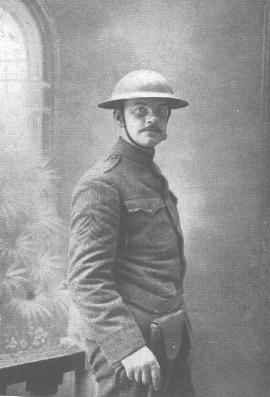
“Joyce Kilmer”. Licensed under Public Domain via Wikimedia Commons – https://commons.wikimedia.org/wiki/File:Joyce_Kilmer.jpg#/media/File:Joyce_Kilmer.jpg
During this week of Veterans Day and Remembrance Day, I’d like to share a poem from World War 1.
In doing research for my novella, Julia’s Gifts, I found this beautiful and moving poem by Alfred Joyce Kilmer, entitled, “Prayer of a Soldier in France,” where Kilmer compares the soldier’s journey to Christ’s passion as a prayer for perseverance.
Prayer of a Soldier in France (1918)
My shoulders ache beneath my pack
(Lie easier, Cross, upon His back).
I march with feet that burn and smart
(Tread, Holy Feet, upon my heart).
Men shout at me who may not speak
(They scourged Thy back and smote Thy cheek).
I may not lift a hand to clear
My eyes of salty drops that sear.
(Then shall my fickle soul forget
Thy Agony of Bloody Sweat?)
My rifle hand is stiff and numb
(From Thy pierced palm red rivers come).
Lord, Thou didst suffer more for me
Than all the hosts of land and sea.
So let me render back again
This millionth of Thy gift. Amen.





 Originally posted on
Originally posted on 





